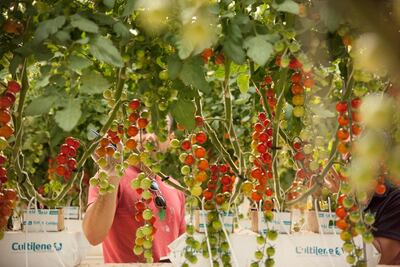One of the UAE’s top food exporters will share its farming expertise to help the Emirates achieve its food security goals.
The Netherlands, the world’s second largest food producer after the US, said boosting agriculture is the top agenda of a joint economic committee it is setting up with the UAE.
The UAE aims to strengthen new programmes and projects to attain food security in the post-Covid-19 world.
“We are going to set up a joint economic committee with the UAE in which agriculture is going to play a big role,” said Lody Embrechts, ambassador of the Netherlands to the UAE.
"Because of the status of our economic relationship, we need to create a framework for the government, private sectors and education providers to boost agriculture," he told The National.
Exports of food from the Netherlands to the UAE have more than doubled in the past seven years, from €57 million (Dh229.1m) in 2012 to €115m (Dh462.2m) in 2019.
Mr Embrechts said while his country exports food to the UAE, the future agenda will focus on helping the country become self-sufficient by boosting local production.
Currently, the UAE imports 90 per cent of its food supply.
“There is a very strong ambition to become more independent in terms of food. The goal for the UAE is to become number one in the Global Food Security Index by 2051,” said Mr Embrechts.
“And this is where we have stepped up our game by bringing Dutch companies with the specific know-how to the region.”
There are a number of local farms that use Dutch smart-farming technologies to grow tomatoes and leafy greens in the desert.
Pure Harvest is one such company.
The founders of the Abu Dhabi smart greenhouse, engineered their farming system after travelling to the Netherlands in 2017.
“Holland has a lot of greenhouse builders, so we’ve worked with several of them to design specifically the system that we need,” said Majed Halawi, vice president of growth at Pure Harvest.
“In essence we learned from the Dutch and improved upon it.”
Their existing one-hectare greenhouse produces around 500 tonnes of tomatoes a year in a controlled environment.
Their first harvest was in October 2018.
“I’m talking now about our small farm, but we are looking at a sevenfold growth,” said Mr Halawi.
“So there will be quite a massive increase in our food production.”
The company currently sells tomatoes and are planning to start growing leafy greens and berries soon.
“We are running a trial with strawberries. We’ll have them ready in the next couple of months, and if that goes well we will start growing them commercially,” he said.
Mr Halawi believes that “anything with a shelf life of under two weeks" should be grown locally.
Technology innovations such as indoor vertical farming and modern greenhouse practices can help the country become less dependent on food imports.
However, it is economically viable to ship long life produce such as grains and potatoes from distant countries.
“It comes down to strategy. If the target is local production while maintaining economic competitiveness, then you need to be very selective,” said Mr Halawi.
“We have seen setups where you can grow cherry trees in a greenhouse. There are several things that can be done”.
Mr Halawi said the biggest challenge in the sector is a lack of awareness around farming.
“Many people think agriculture is buying a farm and tomorrow you will have a product. It is technologically very demanding, especially in this part of the world,” he said.
“Education is the key. Farmers should not only have the skill set in growing tomatoes but they need to understand the machine that is going to grow the produce.”

Another local producer who has been using Dutch technologies to grow leafy greens all year round, is Madar Farms.
About a year ago, the farm partnered with a leading Dutch company, Certhon, to design its facility.
“They are importing the high-tech hardware that is simply not available here,” said Kyle Wagner, head of operations at Madar Farms.
The company plans to start growing tomatoes and vine crops soon.
The first lot of tomatoes are expected to be on the shelves in local supermarkets in January next year.
“Initially we’ll be producing about 1,000 kilos of tomatoes a day, and we have expansion plans for the future," said Mr Wagner.
Local producers have a much stronger case to scale operations amid the coronavirus pandemic, he said.
Mr Wagner said knowledge gaps need to be plugged at the consumer and supplier levels to help build a sustainable agricultural ecosystem.
Madar Farms have proposed introducing the basics and importance of farming in the school curriculum that can encourage pupils to consider this as a career option.
Mr Embrechts of the Dutch embassy agreed that agricultural education can be introduced in schools.
“Not everything has to be at the university level. It is very important to create awareness and interest in what agriculture is all about in terms of business,” he said.
While the Netherlands transfers food-growing technologies, the ambassador said exports are not down due to the coronavirus pandemic.
“We are growing more than enough,” he said.
“Today, Dutch airline KLM flies out 15 tonnes of cargo five times per week to the UAE, of which mainly are food items.”




